violence
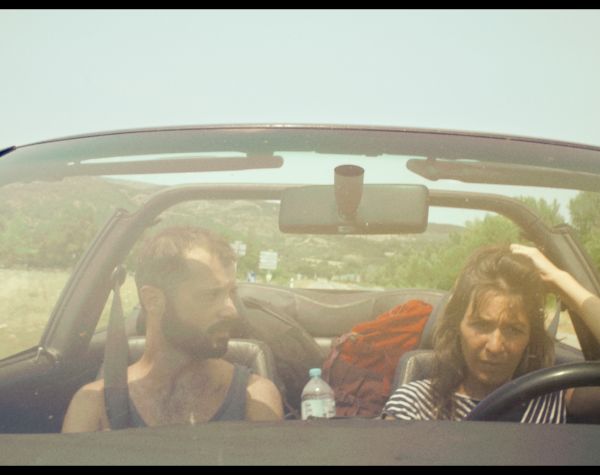
Abysses and Wonders
Christine’s father died when she was still a small child, and she remained in the care of her sadistic mother, who beat her and abused her psychologically. Christine is still convinced that her mother hid a farewell letter from her beloved father. Jean’s father committed suicide several years ago, and left behind a lengthy letter, but Jean never found the courage to read it. Together, Christine and Jean embark on a unique road trip across the French countryside to visit Christine’s mother, and try to confront the past. During their journey in the sunny atmosphere of summer days, with a mixture of humour and irony, they uncover deep family traumas from the seats of their convertible, and look for ways to understand them. They meet friends and random passers-by and, in authentic conversations, come up against the fact that pain caused by those closest to us is a universal human experience. Gradually, the question arises as to how much we are determined by what we have inherited from our parents. How can we overcome generational trauma, and ensure that we do not hurt our loved ones as we were hurt?“I think for a long time I thought she was intelligent, so there were things she could teach me about life. But actually, not at all, she had a shit life.” — Christine
director: Jean Boiron-Lajous
original title: Gouffres et Merveilles
country: France
year: 2025
running time: 78 min.

Blood of the Condor
This work of docufiction, filmed in collaboration with the Quechua community of the Altiplano plateau, bears witness to the secret sterilizations of women carried out by American health workers as part of the Peace Corps in Bolivia. In a stark narrative about powerlessness, intransigence, and grief, the camera absorbs the faces of the local people and the high mountain landscape. The soundtrack, created by the Teatro Collasuyo group, creates a raw composition from ambient noises, sobs, and traditional instruments. The title refers to a sacred Andean bird, which becomes a metaphor for the sacrifice and resistance of the indigenous people against colonialism and violence. “[The Blood of the Condor] is furious, lyrical, and unflinching—though it stops short of becoming didactic. In lieu of a traditional distribution strategy, Sanjinés and his team travelled around the Altiplano and small villages of western Bolivia with a projector, speakers, and a generator, showing the film on a white sheet. Sanjinés estimates 250,000 Bolivians saw the film, and protests in the capital inspired by the film’s critical portrayal of US intervention led to the expulsion of the Peace Corps from Bolivia in 1971.” — Lucia Ahrensdorf, Notebook Primer: The Grupo Ukamau Source: Mubi Notebook
director: Grupo Ukamau , Jorge Sanjinés Aramayo
original title: Yawar Mallku
country: Bolivia
year: 1969
running time: 69 min.
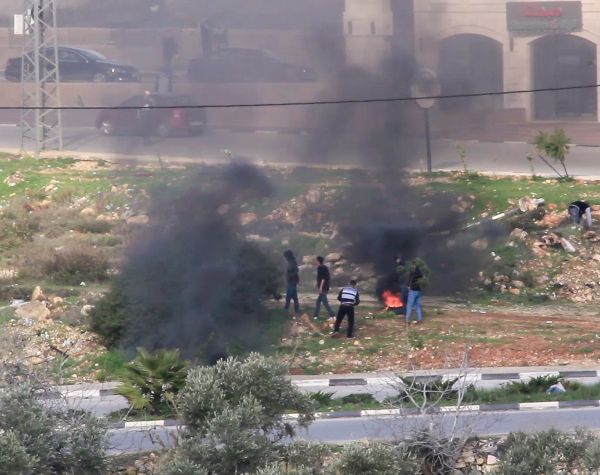
Ramallah, Palestine, December 2018
The incomprehensible clamour of loudspeakers, the honking of cars, the backs of boys gazing into the distance, fires, trash, deserted houses, and a group of soldiers inhabit a sensually saturated landscape dominated by functional chaos. The mosaic of micro-events with several visual planes is reminiscent of the paintings of Pieter Bruegel, with the difference that this is not a genre scene painted by the Dutch master. A single-shot testimony in real time, piece by piece, reveals the violent clash between Palestinians and Israeli soldiers on the West Bank. It depicts the mechanism of occupation, which cyclically closes in on itself and begins where it ends. “By reframing, invoking the off-screen or playing with cuts or the duration of shots, the artist seeks to create spaces that allow us to regain mobility and critical spirit.” Source: https://juliettelemonnyer.com/about
director: Juliette Le Monnyer
original title: Ramallah, Palestine, décembre 2018
country: Belgium
year: 2025
running time: 10 min.

Sixty-Seven Milliseconds
It took sixty-seven milliseconds for the bullet from a police gun to hit an Arab youth in the face. This surgically precise reconstruction of a real event in a Paris suburb uses security camera footage, digitally generated images, and the early cinematographic technique of chronophotography to stylistically decompose the trajectory of the bullet and the body. Time and space collide at the boundary between the modern world and algorithms, the old and the new, the cybernetic and the physical, merging into a meditation on the illegitimacy of racially motivated police violence directed against a marginalized group of people.“The theory of knowledge, allied to that of Capital, is expressed here through the metaphor of liquidity, a fantasy shared by teenagers, engineers and preachers of a world without losses and without borders that is constantly being regenerated.” — Harddiskmuseum
director: fleuryfontaine
original title: Soixante-sept millisecondes
country: France
year: 2025
running time: 15 min.
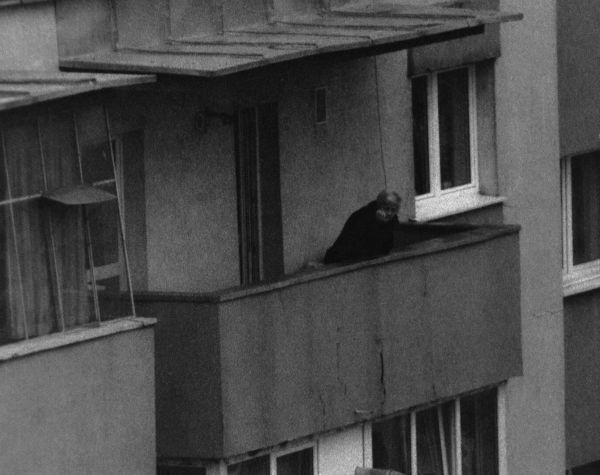
Talking Shadows
Through its secret service, the Securitate, the Romanian communist regime built a monstrous system of spying and mutual surveillance of its own citizens. This stylized documentary, imitating the optics of hidden cameras, reveals in three short interviews the terrifying dimensions that the need for pervasive control can take on. “Film is to her a medium with a particular quality that implies a fundamentally concrete relationship with time.” — Lévana Schütz’s website
director: Lévana Schütz
original title: Umbrele vorbesc
country: Romania, Switzerland
year: 2025
running time: 15 min.

The Bombing of Rafah
Rafah, a city on the border between Gaza and Egypt, became the target of four days of bombing after the kidnapping of an Israeli soldier on August 1, 2014. The Forensic Architecture collective analysed footage from mobile phones and satellite images and compiled an accurate spatiotemporal model of the events using synchronization, 3D modelling, and examination of the shapes of smoke clouds, shadows, and craters. This served as evidence for Amnesty International, which did not have physical access to the area, to accuse Israel of war crimes. Pure work with digital traces is transformed here into an image of the world—a detective visualization of destruction and its impact on the civilian population. “Today, artists are engaged in investigation. They probe corruption, human rights violations, environmental crimes and technological domination. At the same time, areas not usually thought of as artistic make powerful use of aesthetics. Journalists and legal professionals pore over opensource videos and satellite imagery to undertake visual investigations. This combination of diverse fields is what the authors call ‘investigative aesthetics’: the mobilisation of sensibilities associated with art, architecture and other such practices in order to speak truth to power.” — Matthew Fuller and Eyal Weizman, Investigative Aesthetics: Conflicts and Commons in the Politics of Truth, Verso Books, 2021
director: Forensic Architecture
original title: The Bombing of Rafah
country: United Kingdom
year: 2015
running time: 9 min.
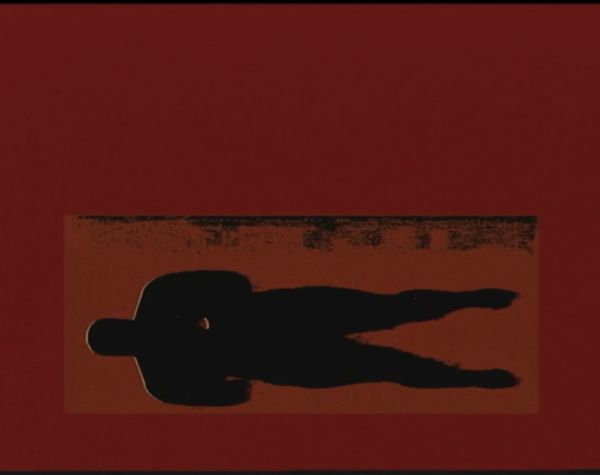
The Sun to Me Is Dark
A digitally animated glitch composition layers, abstracts, and mutates technological traces of remnants—Pompeian relics, torsos, X-ray images, shots of animals—into a rhythmic whole. The field alternately fills and empties, while the sound purrs and hums; the minimalist audiovisual composition achieves absolute, albeit elusive, precision. “Like a creation myth, [the film] represents the potential to create and release something new, like a pixel primordial soup. It emphasizes the act of watching, observing, perceiving, and receiving images. It shows the relationship between photographic technology, the apparatus itself, ‘the machine,’ and the complex distortions of perception and imagination. Made with a malfunctioning 1990s special effects device.” — accompanying material for the film
director: Lina Selander, Oscar Mangione
original title: The Sun to Me Is Dark
country: Sweden
year: 2024
running time: 9 min.
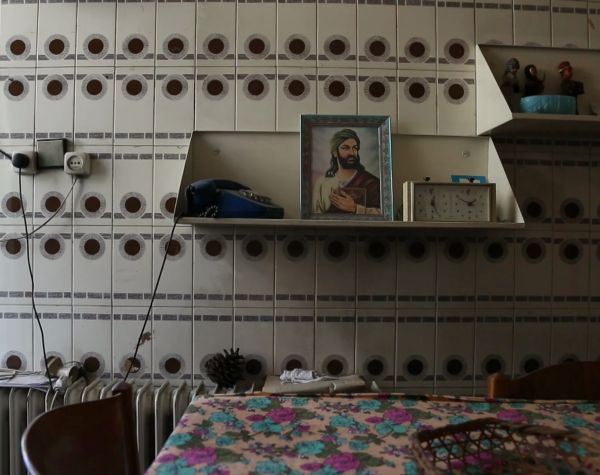
The Vanishing Point
The camera pans several times across the empty apartment. It seems spacious, unused, neglected. In this autobiographical film, the director returns to the places where her family lived before they were forced to flee the country. With its transformation into an authoritarian theocracy after 1979, Iran became a regime that oppressed many groups of the population—primarily women, but also advocates of liberal values and secularization. It was as if, almost overnight, the Middle Eastern country had become a different society. In the film, we cross this invisible boundary between the old and new worlds several times and, together with its author, try to catch the vanishing point on the horizon of both the past and the future. “My work is one concerned with the labour of memory, an attempt to make a placeholder for more to come forward, and an invitation to reflect together and participate in the archive.” — Bani Khoshnoudi
director: Bani Khoshnoudi
original title: Noghteh-e-Goriz
country: Iran, United States, France
year: 2025
running time: 103 min.
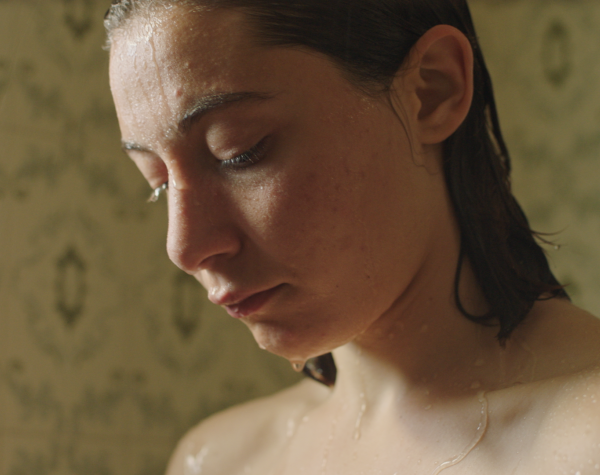
The Visual Feminist Manifesto
This cinematic poem tells an epic tale of being in a woman's body – that of a woman born into a fiercely patriarchal Middle Eastern society. The poetic language of this staged documentary accumulates culturally and politically charged meanings through literary and visual metaphors. The narrative voice in the collective plural becomes an expression of the experiences of countless different women. It speaks of the constant, persistent definition of relationships in relation to men. Of physicality, which brings a moment of identity, sensuality, and a feeling of impurity in the eyes of others. But above all, it speaks of the insistent need to be oneself, in one's own body and world. “It is inescapable to wonder: were we conceived in love and lust? Or are we daughters of guilt and disgust?” — Tijana Mamula, NERO
director: Farida Baqi
original title: مانيفستو
country: Syria, Lebanon, Germany, Sweden, Netherlands
year: 2025
running time: 74 min.
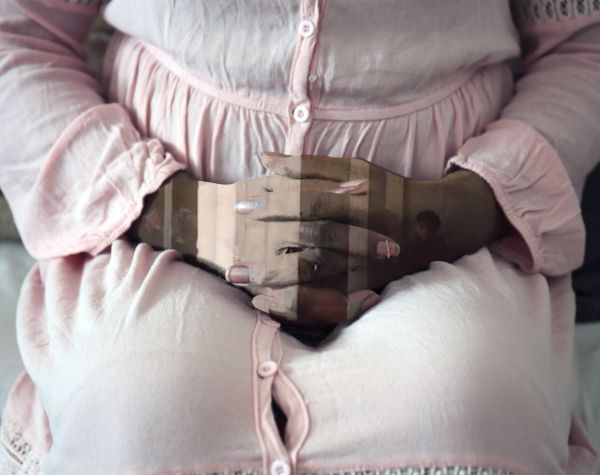
The Woman Who Walks
Authentic testimonies from women in sub-Saharan Africa reveal the suffering and violence that accompany their hopeful journey to Tunisia and southern Europe. Their faces remain hidden from the camera; we see only fragments of their bodies and destinies. A chilling portrait of people who would rather risk death at sea than life in their own country. “I told myself: live or die.”
director: Francesco Clerici, Khaoula Matri
original title: La femme qui marche
country: Italy, United Kingdom, Tunisia
year: 2025
running time: 27 min.










